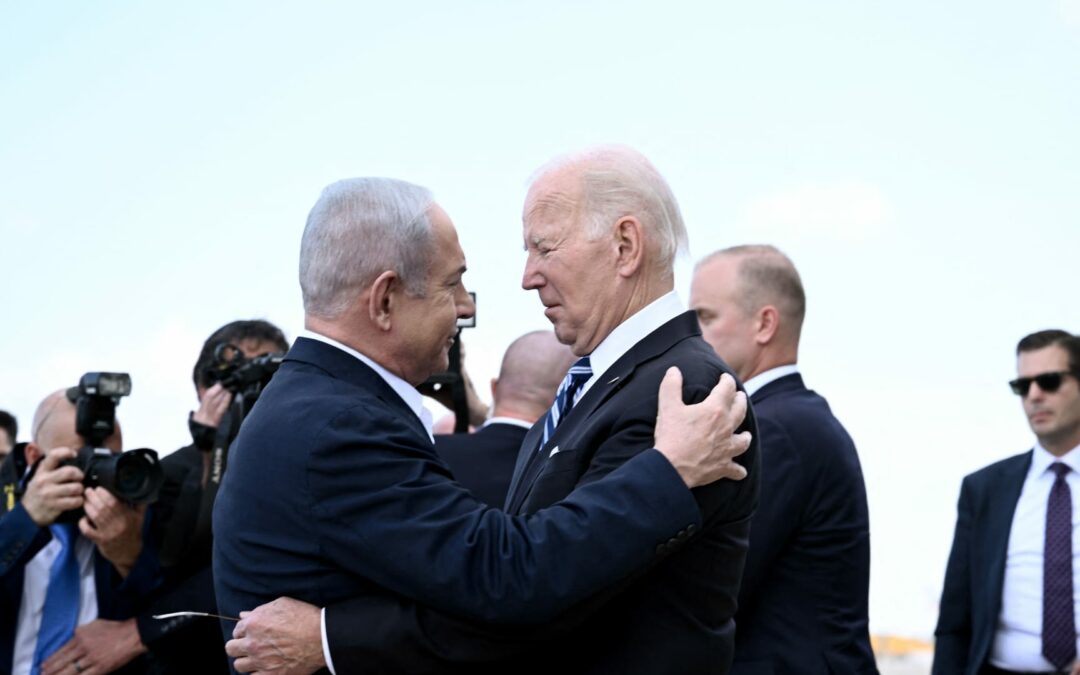Hamas and Israel trade blame for Gaza hospital blast that killed at least 500
Hamas and Israel are blaming each other for the deadly blast on a Gaza hospital Tuesday night that killed hundreds of people. The World Health Organization called the strike on a hospital in Gaza “unprecedented in scale.”
Horrific scenes of the wounded ignited street protests in capitals across the region as Arab protesters and leaders assigned the blame squarely on Israel’s Defense Forces.
Palestinian U.N. envoy Riyad Mansour said Israeli forces caused the “massacre” and called for an immediate ceasefire, while the U.N. Ambassador for Israel Gilad Erdan assigned responsibility to the militant group Palestinian Islamic Jihad.
— Natasha Turak
Biden lands in Tel Aviv to meet Netanyahu for ‘solidarity’ visit
U.S. President Joe Biden touched down in Tel Aviv as he commences a visit to Israel meant to show solidarity with the country after it suffered its largest-ever terrorist attack, carried out by Palestinian militant group Hamas, on Oct. 7.
Biden wrote on X on Tuesday: “On Wednesday, I’ll travel to Israel to stand in solidarity in the face of Hamas’s brutal terrorist attack.”
In the post, he added that he would also visit Jordan and meet with Arab leaders to discuss humanitarian aid and next steps for Palestinians. But the Arab leaders Biden was scheduled to have a trilateral meeting with — Egyptian President Abdel Fattah el-Sisi, Jordan’s King Abdullah II and Palestinian Authority President Mahmoud Abbas — canceled the meeting after a blast at a Gaza hospital Tuesday night killed more than 500 people.
Hamas and other Arab leaders blamed Israel for the strike, while Israel says it was caused by a failed rocket fired by Hamas affiliates inside Gaza.
The White House has so far fully supported what it says is “Israel’s right to defend itself,” and Biden has requested that Congress approve more military funding for Israel.
Israel responded to the Oct. 7 Hamas attack with a ferocious bombing campaign over the Gaza Strip, the Israeli-blockaded territory which Hamas governs. It has been criticized by international aid organizations for its tactics which they say overwhelmingly harm civilians.
More than 1,300 Israelis have died in both the Hamas attack and ensuing conflict, while Israel’s bombings and siege over Gaza have killed more than 3,000 Palestinians.
— Natasha Turak
Biden plans to request $100 billion in funding that would include money for Israel, Ukraine
President Joe Biden is planning to submit a request for $100 billion in supplemental funding to Congress in the coming days that would include money for Israel, Taiwan, Ukraine and U.S. border security, two people familiar with the discussions told NBC News.
One source said the details of the package have not been finalized and could still change. The president is expected to send his request to lawmakers by the end of this week after he returns from his Middle East trip.
— NBC News
U.S. State Department advises Americans to not travel to Lebanon
The U.S. State Department advised Americans against traveling to Lebanon, citing an unpredictable security situation due to kidnappings, unrest in the wake of the Israel-Hamas war and “rocket, missile, and artillery exchanges” between Israel and Hezbollah.
The department raised its travel advisory for Lebanon to level 4, the highest on its rating scale, and warned that the embassy in Beirut has limited capacity to support U.S. citizens there.
State currently has a level 4 travel advisory for Gaza, citing terrorism, civil unrest and armed conflict. It has a level 3 advisory for Israel and the West Bank, recommending Americans reconsider traveling due to terrorism and civil unrest.
— Christine Wang
At least 17 journalists killed since war began, Committee to Protect Journalists says
The Committee to Protect Journalists said at least 17 journalists have been killed in the Israel-Hamas conflict. Of the known deaths, the CPJ said 13 were Palestinian, three were Israeli and one was Lebanese.
It said eight journalists have been injured and three have been reported missing or detained.
The nonprofit said it continues to investigate “unconfirmed reports of other journalists being killed, missing, detained, hurt or threatened, and of damage to media offices and journalists’ homes.”
“CPJ emphasizes that journalists are civilians doing important work during times of crisis and must not be targeted by warring parties,” said Sherif Mansour, CPJ’s Middle East and North Africa program coordinator. “Journalists across the region are making great sacrifices to cover this heartbreaking conflict. All parties must take steps to ensure their safety.”
— Christine Wang








